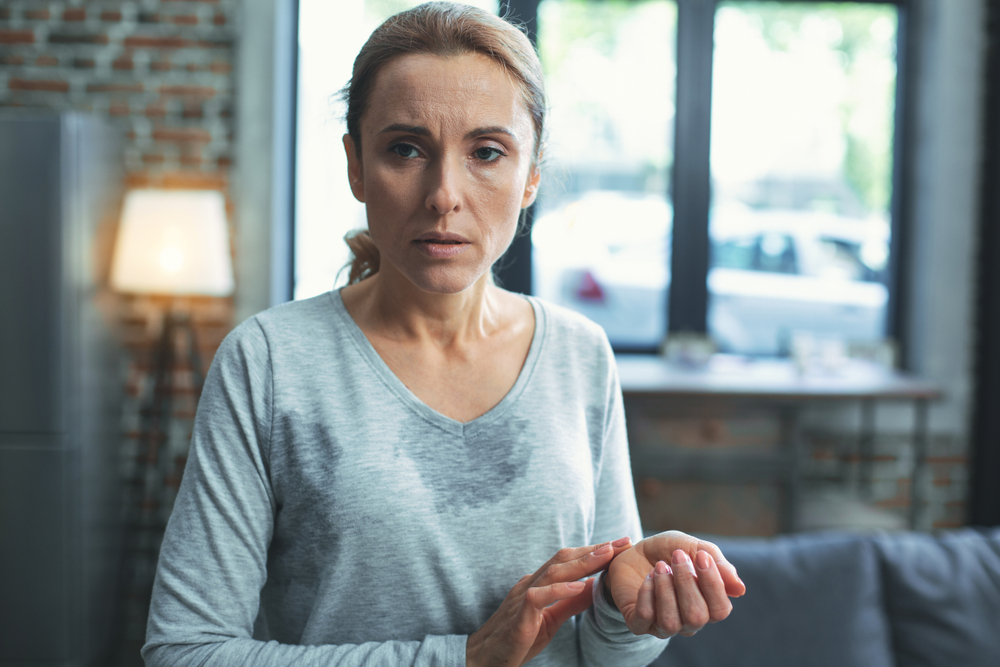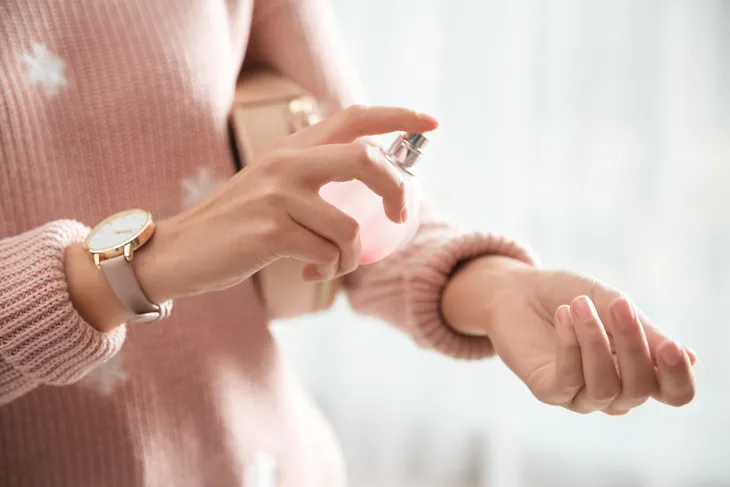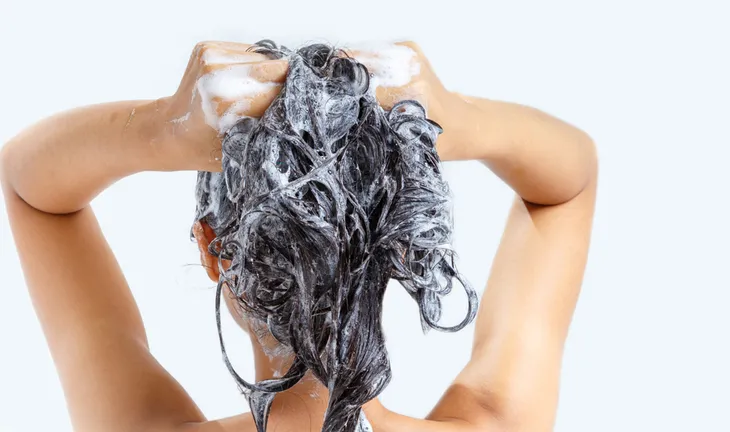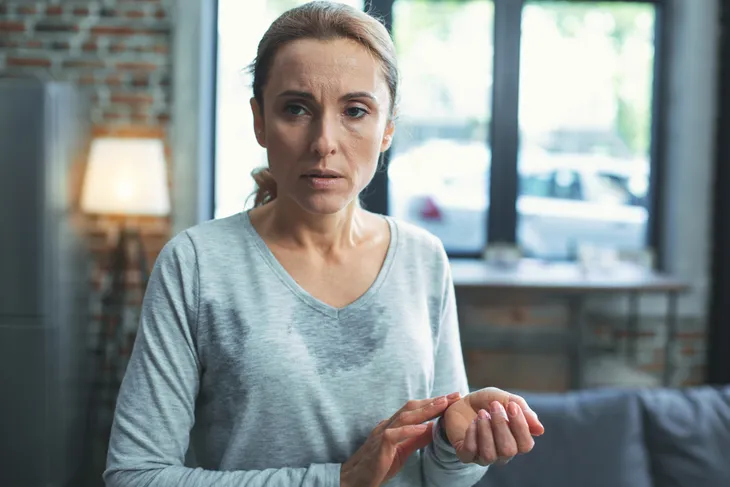Let’s see a show of hands ladies—how many of us nuked last night’s dinner in microwavable plastic? And how many of us know if our favorite perfume, body wash, or candle contains phthalates, a chemical used in plastic manufacturing? According to health experts at the Washington University located in St. Louis, Missouri, many chemicals we use unknowingly can trigger early menopause.
Dr. Amber R. Cooper, an Missouri-based infertility and reproductive endocrinology specialist, points to eight chemicals that can prompt menopause up to four years earlier…
Perfumes and Fragrances
Phthalates may be lurking in your favorite perfume or cologne without your knowledge. According to the National Institutes of Health, phthalates are chemicals used in hundreds of different consumer products—typically to soften and lend flexibility to vinyl and plastic.
However, in fragrances, phthalates are used to extend scent so that one spritz of your favorite perfume lasts longer. Extensive exposure to certain chemicals, phthalates in particular, have been linked to an early onset of menopause, according to gynecology researchers at Washington University School of Medicine, in St. Louis. To find a scent minus the chemical additives, choose an organic, phthalate-free scent and re-apply it more frequently.
Fish
Even though PCBs (polychlorinated biphenyls) have been banned in the U.S. since 1979, humans still risk exposure via water, air, and the natural food chain. Fish is one food source at risk of PCP ingestion, and unfortunately these man-made chemicals don’t break down, which means you may consume them without knowing.
Chemicals, like PCBs, enter the food chain through the water after they’re disposed of improperly. Fish then ingest chemicals and humans do the same when they consume contaminated fish. Research from the Natural Resources Defense Council, point to the Great Lakes as containing high PCB levels. This means that fish caught in the lakes are at risk. Luckily, you can research locally caught fish and levels of PCBs in surrounding area water by contacting your state health department.
Air Fresheners and Candles
Unless you’re lighting soy-based, led free, phthalate-free candles, you’re likely inhaling chemicals that put you at risk of earlier menopause. Even if your favorite vanilla cream air freshener or baked cookie candle clearly states it’s “unscented” or “natural,” National Resources Defense Council testing reveals that most popular brands still contain phthalates.
The same goes for any candle that has synthetic fragrance added to make it smell oh-so-good. The only way to avoid phthalates in fragrances is by buying beeswax, essential-oil-based or soy candles with a lead-free wicks.
Plastic Food Storage Containers
You’ve likely heard horror stories about microwaves and cancer. Well ladies, it turns out not only nuking your meals, but nuking your meals in plastic may also put you at risk for early menopause. Phthalates, added during plastic manufacturing to make products flexible, are undoubtedly in your food storage containers, frozen dinner packaging, plastic jars, and plastic tub containers…unless they specify “phthalate-free.”
The majority of additives in plastic can leach out into the food that you’re storing and then cooking—especially since heat increases the chemical-release process. Scientists at Berkley, California’s Green Science Policy Institute recommend nuking food in glass, on paper, or in microwave-safe ceramic containers.
Personal Hygiene and Beauty Products
Likely the guiltiest source of the whole lot—personal hygiene and beauty products (i.e., body wash, shampoo, and body and moisturizing lotions) are rife with phthalates. Just look at the squeezable, plastic packaging they come in!
Products with artificial fragrance added are also hotspots for phthalates, which many manufacturers won’t list among the product ingredients. To ensure phthalate avoidance, opt for fragrance-free, natural, organic, and specifically “phthalate-free” personal care products. Jason’s Natural Organics, Earth’s Best, Burt’s Bees, Dr. Bronner’s, and Origins are popular phthalate-free, natural brands.
Fresh Produce
That bright, shiny red apple certainly looks fresh, but depending on where it was grown, it could have been sprayed with toxic pesticides. However, if you can’t always afford to buy all of your fruits and vegetables organically, the Environmental Working Group (or EWG) can help with a peak inside their annual Shopper’s Guide.
The “Dirty Dozen” within provides a list of the most pesticide-prone produce to hit American supermarkets according to testing by the U.S. Department of Agriculture and the U.S. Food and Drug Administration (USDA). So you can be sure to at least purchase these 12 pesticide-prone fruits and veggies organic.
Meat and Dairy Sources
PCBs not only lurk in fish unable to break down. These man-made compounds also leach into dairy and meat that we buy in the supermarket via consumption/absorption through farmed livestock.
While one way to avoid PCBs in your food is to opt for only organic, antibiotic, and hormone-free meat and dairy at your local supermarket. You can decrease your environmental exposure to toxins even more by reducing your overall consumption of meat and dairy by opting for more vegetarian and vegan meals each week.
Tiny Chemical Amounts from Multiple Sources
According to a PLOS ONE study, U.S. women with the highest levels of menopause-causing chemicals in their bodies consumed tiny amounts of chemicals from multiple sources versus one major source. The study found that females who went into menopause between 2 and 4 years sooner consumed endocrine-interrupting chemicals through multiple channels.
Dr. Cooper, an assistant professor, infertility specialist, and endocrinologist at Washington University, claims that one product or food won’t account for all of your exposure to menopause-inducing chemicals. However, tiny amounts of every day exposure from different products and foods with PCBs, phthalates, and pesticides, and phthalates is more likely to augment over time.











